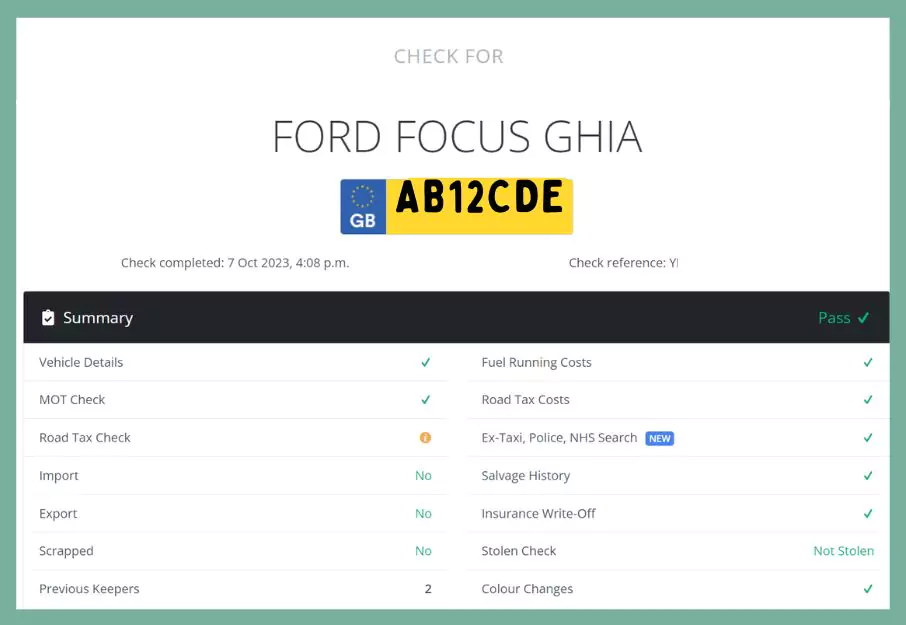
Buying a Used Car in the UK as a Non-resident
09 Nov, 2023
Are you a New Zealander or Australian considering buying a used car in the UK?
Buying a used car in the UK as a non-resident can be challenging but it is not impossible. We recently arrived in the UK in October 2023 with the plan to stay for nearly 3 months, then carry on into Europe for another month after that. We had secured some incredible house sits in rural locations across Scotland, England and France that didn’t have easy public transport links so we had to weigh up whether we would purchase a car or hire a rental car long-term to get around. We decided to buy a car in the UK as it was considerably cheaper than a rental car and we thought it’d be less stress, give us more freedom, and we would be able to take the dogs we were looking after on short adventures.
Disclaimer: This post contains links to our preferred travel products and services. When you purchase through these links, your purchases can generate a small profit for us, without any added cost to you. This helps us to continue offering top-notch travel advice and savvy savings tips on how you can make cents of travel. Rest assured, we only share links to products and services that we personally love to use.
Our Story
Most people we talked to told us that purchasing a car in the UK was not worth it. They explained how difficult and expensive UK car insurance was and that we should utilise public transport instead, then use shorter term hire cars when needed.
We did not heed the advice and persevered with our decision to purchase a car. Unfortunately, we found little to no helpful information on the process of purchasing a car in the UK as a non-resident, especially for people looking to purchase a car for only a few months like us. That is why we decided to put together this useful guide on how to purchase a car in the UK as a non-resident based on our recent experience for others wanting to do the same. There are comments at the bottom of this blog so please feel free to add a comment of your experience purchasing a car in UK. Questions are also most certainly welcome!
We thought we could get away with a budget of £1000 for a car as there seemed to be plenty of cars available in this price bracket and any car we purchased would only need to last four months or so while we were in the UK, then Europe, how hard could that be! However, our confidence in finding a new set of wheels was set back when we realised the poor quality of the cars in our budget!
After six gruelling days confirming an insurance company who would actually insure us as non-UK residents and on foreign drivers licences, as well as finding an affordable car in a reasonable condition to purchase in the Manchester area, we finally got one! A stunning baby blue 2005 Ford Focus for £1200.
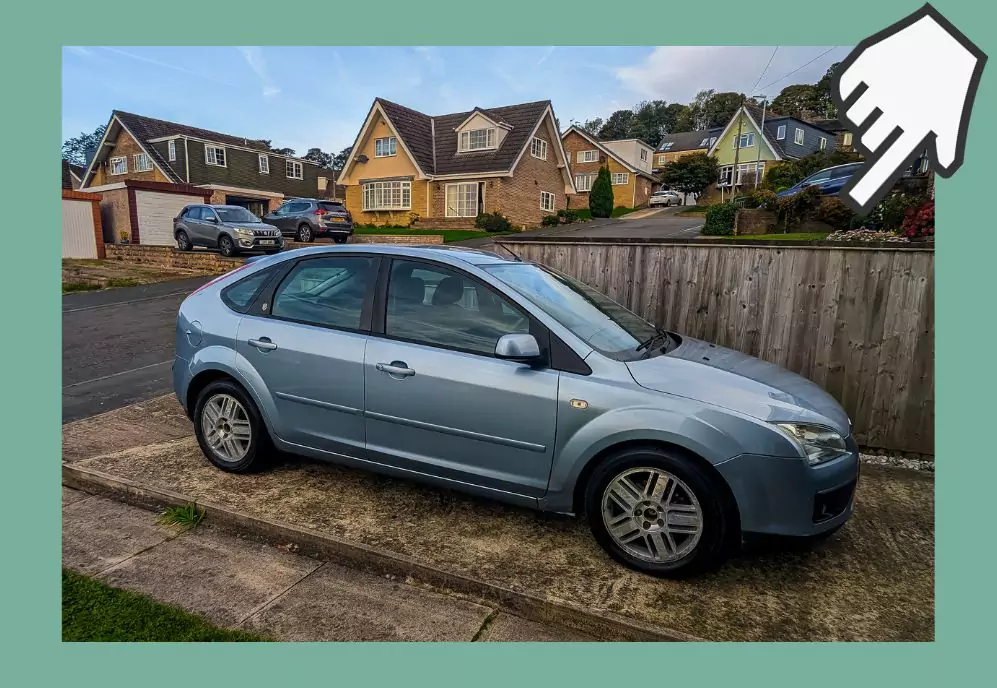
Some background information on our driving history for you to compare to your situation:
1. Tim has held his full drivers licence for 15 years, while I have had mine for 12 years.
2. Tim has 10+ years of no claims on his insurance record while I have one claim 3 years ago from when an elderly lady accidentally backed into my parked car (I’m not entirely sure why this should impact my record, however it does.)
3. We both have NZ and Australian Drivers Licences. We’ve had our NZ licence for the longest amount of time so it made sense to use our NZ licence to obtain car insurance in the UK.
Buying a used Car in the UK as a Non-Resident
The Process of how to purchase a car in the UK as a non-resident
1. Request a letter of claims
The first thing you should do if you want to purchase a car in the UK is to contact your previous car insurer/s to request a letter of claims. Most UK vehicle insurance companies will want to know if you have had any insurance claims in the past and some companies may even provide you with a discount if you have a zero claims history. My previous cars were insured with AA and AMI in New Zealand and Tim had insurance thorough Aon. We were sent letters from each of the insurance companies within a couple of days.
2. Identify a residential address for the V5C form to be delivered to
This can be a tricky one when you’re like us and travelling with no permanent address, especially if you don’t have any friends or family in the UK. We were lucky to have a friend who was happy for us to use their UK residential address. The address is used as the postal address for the V5C form, contact for the DVLA and address for any fines or refunds. For insurance, we let them know we would be moving around often and staying at a number of different residential addresses and hotels which was no issue for them.
3. Get a UK phone number
As soon as you arrive in the UK, get yourself a UK phone number. This will make it easier for you to contact the insurance companies for quotes and to contact sellers. We grabbed a SMARTY sim card that cost £10 a month for 40GB data and unlimited calling and texting to other UK phone numbers.



4. Search for cars in your area
Our search area was Manchester and the surrounding areas. We scoured the latest cars on Auto Trader and Gumtree to locate potential cars for sale. We expanded our search area to include neighbouring towns and cities knowing the public transport links were reliable and would run frequently. Over the six days, we spent hours busing out to view different cars. We found Uber was handy to access cars that were advertised in difficult to reach locations.
5. Request a quote from an insurance company
When you have a rough idea of the sort of car you would like to purchase, select an example of that car that is currently advertised to request a quote from an insurance company.
It is a legal requirement to have a minimum of third party insurance in the UK. We looked into temporary insurance, and standard insurance.
Temporary Insurance covers a driver for a period from an hour up to 28 days. We thought that maybe we could string a couple of 28 day periods together to make it up to three or four month but alas, none of the temporary Insurance companies we reached out to would insure us as non residents or non-UK or European Drivers Licences.
Ideally, we were wanting to obtain a car insurance quote using the online quote generators before we arrived in the UK to figure out the estimated cost of insurance. However, without a UK number we found this to be impossible. It turns out that because we were not residents in the UK and did not have UK driver licences, NONE of the online insurance quote websites would insure us or give us a quote anyway.
In the end, when we were close to giving up on being able to find an insurance company who would insure us, we phoned Sterling Insurance who said ‘No Problem!’ and offered us car insurance. I have heard of other New Zealanders and Australians using Admiral and Marshmallow.
Phone the insurance companies. It's much faster than filling in countless online forms just to be returned an email saying they don't insure foreign drivers licences!
To insure our 2005 Ford Focus with third party, fire and theft and a £900 excess for 4 months including up to 60 days in the EU cost us £740. I know you will be gasping at the price of insurance in the UK compared to New Zealand and Australia, we did too! We had heard it was expensive so originally budgeted $1000aud for 3 months of insurance. The final figure wasn’t far from that estimate.
To insure our 2005 Ford Focus with third party, fire and theft and a 900 GBP excess for 4 months including up to 60 days in the EU cost us 740 GBP.
We knew that vehicle insurance in the UK was going to be expensive so made sure to include the cost when planning our year of travel.
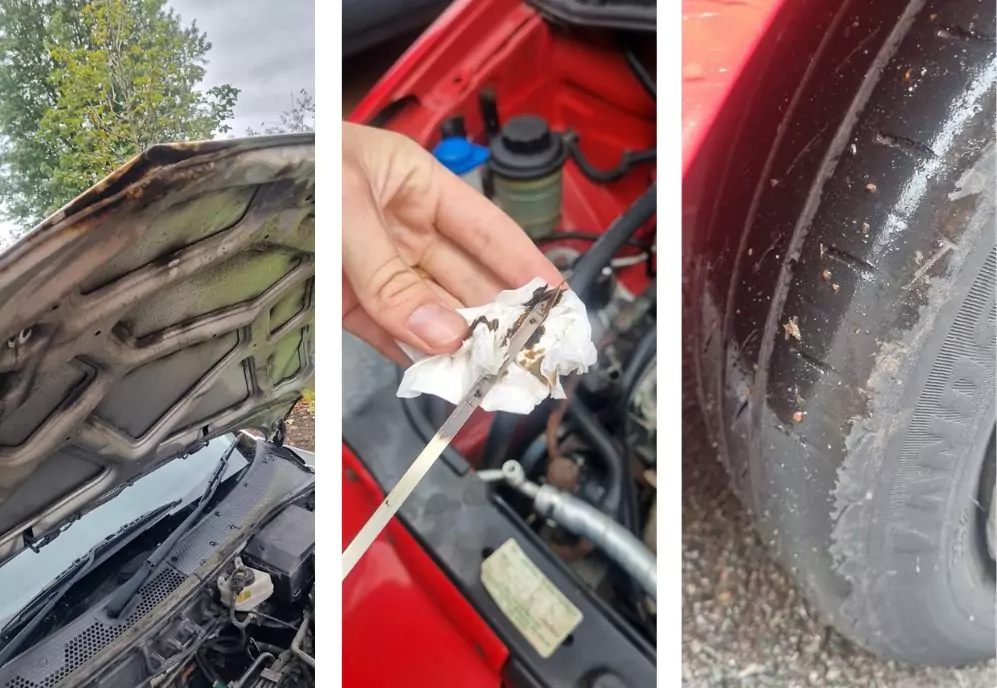
6. Inspect potential cars to purchase
When you have a guaranteed vehicle insurer, you can go and inspect the cars you have identified as potentially worth purchasing. Most cars for sale in the £1000 bracket tended to be advertised by second hand car dealers or people who were flipping cars that had been traded into the larger car dealers. The advertisements for cars in the UK had limited information on the car, especially any faults or issues. We found this frustrating as we would make the effort to go see a car and after looking at it for 2 minutes it would be an obvious NO. I would recommend phoning the seller and asking as many questions as you can before you make the effort to view a car but keep in mind car salesman are not always the most honest of people.

Our Two Cents Newsletter
7. Here are some important things to consider when purchasing a car in the UK
- Fuel efficiency: The more fuel efficient your car is, the less tax you must pay. You can check the tax brackets for cars registered between 1 March 2001 and 31 March 2017 here.
- Insurance category: Most advertisements will display the insurance category of the car. The lower the number, the cheaper the insurance is going to be. Take note of the insurance category of the car you received a quote for as the insurance category is a major indicator of insurance cost. If you then start looking for cars in a higher insurance category, be aware that the cost of insurance will increase.
- Euro rating: You want to purchase a vehicle with a euro rating of 4+ for petrol or 6 for diesel so you don’t have to pay a fee when you drive in any ULEZ areas (Ultra Low Emission Zones.) ULEZ areas are located in the middle of London and many other UK city centres.
- Petrol vs Diesel: Diesel is more expensive than petrol at the pump in the UK but you don’t pay road tax for having a diesel like you would in New Zealand. When we were in the UK in October 2023, the price of fuel was on par with NZ prices at the time.
- MOT: A MOT is similar to a warrant of fitness in New Zealand, ideally you want a car with a long MOT and with minimal issues (advisories) flagged on previous MOTs. You can review previous MOT advisories on this MOT Checker website. An advisory is an issue that the inspector thinks will need to be addressed before the next MOT is due in a years time. After a car receives a MOT, it is valid for 12 months. Be aware that there are dodgy or less thorough MOTs being given out, particularly to older cars. We now know for sure that our car shouldn’t have passed the MOT the week before we purchased it with no advisories when the issues from the previous MOT had not been addressed!
- Service history: A service history is not compulsory however it is helpful when the seller has evidence of service history especially whether the cambelt has been done recently in older cars. You can check the typical cambelt replacement milage and how much the replacement costs for the specific model of car online.
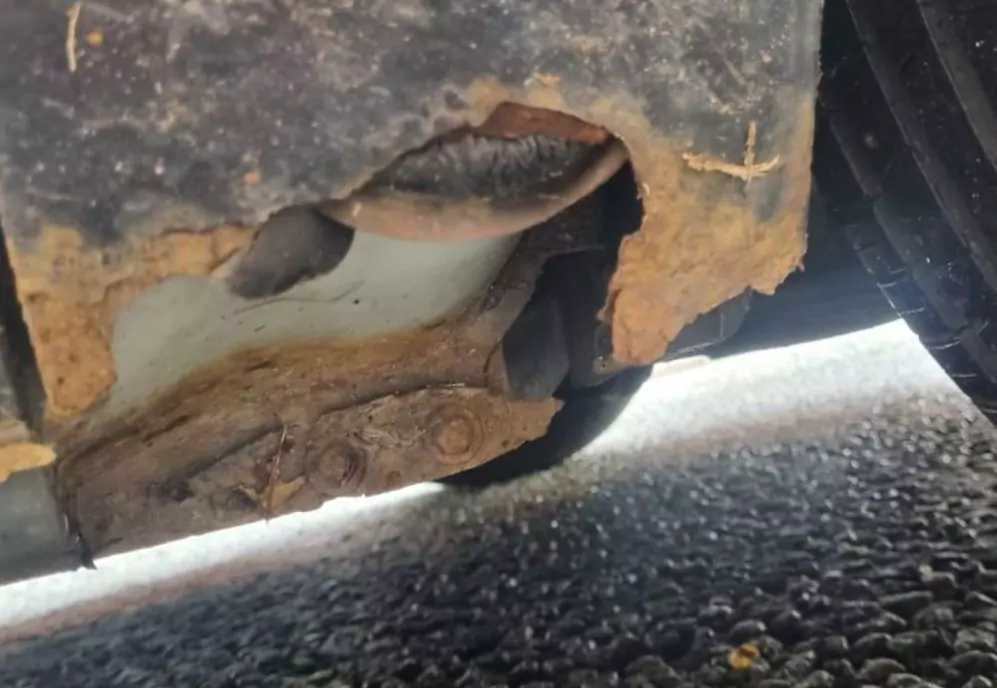
- Rust: Rust on cars is common in the UK due to the councils putting salt on the road in the winter instead of grit like back home. All older cars are likely to have some degree of rust, you just need to assess if it is severe enough to prevent you from purchasing the car (ie. Is it superficial or structural) Due to rust being such a big problem in the UK, the cars don’t last as long. You are unlikely to find any 1990’s cars available unlike back in New Zealand or Australia.
We found a car that was looking ideal apart from some major rust spots and not being mechanics ourselves, we were unsure of how bad this rust really was. We took photos of the rust and talked to a nearby mechanic to get their opinion. The mechanic advised us not to purchase the car as the rust could potentially be a major issue. Thanks mate!
- Consider paying a local mechanic to assess the car before purchasing: We regretted not doing this with the car we brought as it ended up having significant mechanical issues that we couldn’t identify ourselves.
- Take it for a test drive: Because of the vehicle insurance laws in the UK, we could not legally test drive most of the cars we were looking at. This made it difficult to identify potential problems with the cars. If you purchase through a car dealer, most of them have temporary plates you can use to test drive cars but we weren't sure if it covered us on our licence, so didn’t test the car as thoroughly as we should have. The first time we drove our car 100km/hr there was a clunk and shaking which we would have been able to identify before purchasing the car had we been legally allowed to drive on the open road or if we took it to a local mechanic for an inspection.
8. Background Check
When you have found the perfect car to purchase, you should order a background check to ensure the car is not stolen, doesn’t have any unpaid finances, any salvage history, and other useful checks. There are many online background checks available. We used VCheck.uk which cost £10 for the full check option.
9. Negotiate a price with the seller
All of the cars advertised around the £1000 mark that we viewed had at least one thing wrong with them that would have needed to be fixed (i.e. new tyres). You can use these downfalls to negotiate a lower price.
10. Insure the car
Call the insurance company that was happy to insure you as a non-UK resident and arrange insurance for your car. We were under the impression that you could call the insurance company anytime as their answering machine indicated that they were open after hours but in a limited capacity. It turns out the limited capacity was not for insuring vehicles!
This caught us out when we decided to purchase the car at 3pm on a Saturday afternoon when Sterling Insurance closed at 2pm. As you cannot legally drive the car until you have insured it and the temporary insurance companies (which would be perfect in this situation) would not insure us on our non-UK licences. We had to pay a deposit for the car and organise a 2-hour trainride back to the car dealer on Monday to collect our car after confirming the insurance that morning. Based on our personal experience, I would make sure to check the available hours you can obtain insurance in because it is an absolute hassle when you find the perfect car and then can’t drive away in it the same day.
11. Sign the V5C
When you complete the V5C form you are registering the car into your name. You keep the temporary V5C form until you receive the new form that will be sent out to your residential address in the UK. Keep the V5C in your car for proof of ownership.
12. Pay the Tax
Legally you must pay the tax before you drive away in your new car. The amount of tax you pay depends on the environmental impact of your car. You can either purchase 6 months or 12 months of tax at a time on most cars. We purchased 6 months of tax which cost us £132. Unfortunately, each new owner needs to pay tax starting from the date of purchase, regardless of whether the previous owner has already paid the tax for the upcoming months. When it comes to selling your car (or returning it on warranty like we did), you can claim back any unused tax as a refund.


13. Grab the keys and drive away in your sick new ride! Your UK adventure awaits you! Enjoy driving through the magical UK countryside, exploring the many cute towns and driving past the Highland coos in Scotland 🐮
As a forewarning for anyone else with a £1000 budget to purchase a car in the UK. We understood that at the £1000 price range we would not be able to afford a late model zero-issues car. However, we were shocked at the poor quality of the cars we looked at. After viewing countless cars, we had little faith that many of them would even make it to the three-month mark.
Here’s a list of things we noticed on physical inspection of cars that stopped us from purchasing cars advertised around the £1000 price point:
- Huge rust areas
- Nearly bald tyres
- Squealing noise from engine, this could have been an indication for the cambelt needing replaced
- Drivers window that wouldn’t go up or down and was taped up, I was a little worried this was a stolen car
- Broken levers on both front seats to fold the seat forward in a three door car
- Fan/AC not working
- A speedometer that didn’t show the speed (Someone walked in off the street while we were at the dealers and brought this car knowing the speedo didn’t work!)
- An engine that made a horrific vibrating noise on idle hurting your ears
- An engine bay that was rusty everywhere
- An engine that made a loud ticking noise
- More lights on the dashboard than your Christmas tree
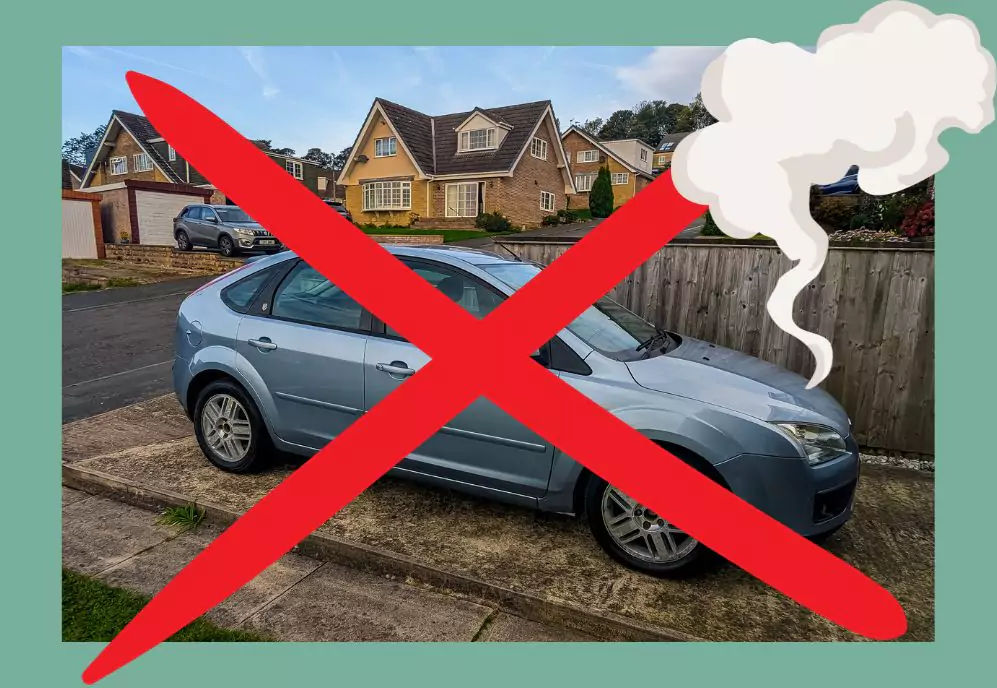
Our Car Wilma (aka Willy)
After the debacle getting insurance sorted for our car, Tim finally went to pick it up on Monday from the dealer. We both settled on calling our Ford Focus ‘Wilma’ which quickly turned into ‘Willy’ because... you know, it was a bit of a d***! Unfortunately for us, we had purchased a car with a major mechanical issue that only came to light in the first week of ownership. Luckily, we brought our car from a dealer who provided us with a 28-day warranty on the engine and gear box. After a miserable week of car issues, we returned the car for a refund.
If you are planning on travelling the UK on a budget, like us, I would carefully consider whether the stress of buying a car in the UK is worth it or not. We were lucky to get a refund but that may not be the case for everyone. We also wasted a good few weeks of our holiday searching for a car and dealing with the issues that arose.
Going forward, we decided to not waste any more of our holiday buying another car and followed the advice initially given to us to use public transport and hire cars on an ‘as needed’ basis.
To reduce the cost of trains around the UK, we purchased a UK Two Together Railcard for £30 that gave up to 1/3 off train tickets around the UK. We continued to use Turo and local rental car companies to hire cars when we need to drive out to our rural house sits.
The easiest way to book trains around the UK is by using Trainline. Bonus: You can purchase and use your UK railcards for Trainline bookings.
We had a blast house sitting our way around the UK from the stunning Scottish Highlands all the way down to Cornwall! Did you know that there are hundreds of house-sitting opportunities available in the UK and Europe every single day? If you are an animal lover interested in house sitting, we have put together a helpful blog article on how to start your house-sitting journey!
Yes and No. I would say absolutely go for it if you have a good understanding of vehicles and would be able to identify and understand the extent of potential issues a car may have. If you have limited knowledge about vehicles like myself and Tim, I would probably avoid purchasing a car unless you are happy to potentially lose your money. Having a higher budget than £1000 may improve your chances of securing a car that is in better condition. If you do purchase a car in the UK, make sure you allow about a week at the end of your holiday to sell it on and research selling a car in the UK.
Drop us a comment below if you have any questions about purchasing a car in the UK, we are more than happy to share our experience with you.

About Us
Hello, Hola, Ciao! We are Tim & Eva, a couple of kiwis who have spent the last few years saving for and planning our epic year-long adventure around the world. Our goal is to inspire fellow wanderlust souls (just like you!) to Make Cents Of Travel by sharing our experiences and strategies we used to turn our dream of long-term travel into a reality.
1 comments
Dean & Gabe
Very helpful blog, thanks.
My partner and I are planning a 3 month campervan trip around Europe, starting in the UK.
We will have a look into the house sitter gig. It could be a good place to build out the bed etc in the courier can we buy.


